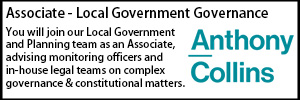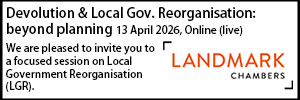Who needs to know what?
- Details
The latest phase in the roll-out of the 5G mobile phone network has thrown up a legal issue of general interest to local government lawyers about the way consultations are conducted, writes David Wolfe QC.
In particular, what does the actual decision-maker (whether that’s an officer, a councillor or a committee) need to be told about consultation responses? As it happens, the decision-maker in this latest example was two Secretaries of State, but the same points apply (and have arisen before) in local government decision-making.
Overall, local government’s general practice of consulting publicly on major policy decisions makes for better outcomes. Sometimes minds change. Sometimes though, the process goes wrong. Legal challenge by ‘judicial review’ is then key to putting things back on track, as seen in 2018 and now again in 2020.
The essence of consultation is listening, even if what is received is not welcome. The law says that the decision-maker – generally a councillor or a committee – must ‘give conscientious consideration’ to consultation responses (see, for example: Moseley v Haringey [2014] UKSC 56 [2014] PTSR 1317).
For that, they obviously need to know what consultees said. Officers can of course read and summarise responses for the councillor or the committee, but not so selectively that the latter’s reading of summary means they have not given the necessary ‘conscientious consideration’.
As one judge put it, treating the Minister as knowing what the civil servant knows when the knowledge was not shared would be ‘the law according to Sir Humphrey Appleton’ (National Association of Health Stores) v Department of Health [2003] EWCA 3133); and the same applies when local government makes decisions following consultation: councillors only know what officers tell them – they are not somehow treated as knowing what those officers know unless it is passed on.
That went wrong in 2018 when the Government consulted on changing planning rules which made it easier for fracking proposals to go ahead. Some responses came from people concerned about environmental impacts. They argued that the Government’s technical reports on fracking’s climate change impacts had been superseded, so Government should think again. But the Minister did not read those responses and his civil servants merely told him of respondents generally opposed to fracking, not mentioning that they had drawn attention to new reports. Realising that the consultation responses from her campaign group ‘Talk Fracking’ had been brushed aside in that way, Claire Stephenson brought a judicial review challenge to the legality of the Minister’s decision to press on. Mister Justice Dove agreed with her: the Minister had unlawfully failed conscientiously to consider the consultation responses and needed to think again (Stephenson v Secretary of State for Housing Communities and Local Government [2019] EWHC 519 (Admin), [2019] PTSR 2209). A few months later, Government announced a moratorium on fracking.
Similarly, in a local government context, the Mayor of London’s decision to close Wimbledon police station was held unlawful because the Deputy Mayor for Policing (who made the actual decision) had not been told by her officials that some consultees had argued for delaying the closure to see if the new IT solutions would, indeed, make the police station counter redundant: Kohler v Mayors Office for Policing and Crime [2018] EWHC 1881.
And I have seen examples in local government of decision-making councillors being told that officers had consulted with (say) the residents of a care home or day centre which is to be closed, but without the decision-maker being told what the consultees had said. Being told that your officers have discussed the proposal with people who may be affected is not the same as conscientiously considering what those people have said. And yet is has been passed off as lawful consultation, when it plainly is not.
History may be repeating itself in 2020 with the Government’s decision to relax planning rules for 5G mobile masts. Some people are concerned that will affect their health. Many responded to the consultation with technical information arguing that Government has underestimated the risk to a small proportion of the population. But again, Sir Humphrey seemed to be in town: Ministers were told that people had generally raised health concerns, but not about the technical and other information they had presented to underpin their points, and so approved the proposal in ignorance. Government may not have welcomed those concerns, but Ministers at least needed to know about and ‘conscientiously consider’ them before deciding to press on. So the safety valve of judicial review is being invoked again – it remains a legal process fundamental to the proper functioning of our political system.
The lessons for local government lawyers are obvious.
David Wolfe QC is a barrister at Matrix, London.
Head of Legal Services / Deputy Monitoring Officer
Legal Director - Government and Public Sector
Locums
Poll

















